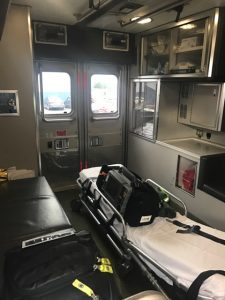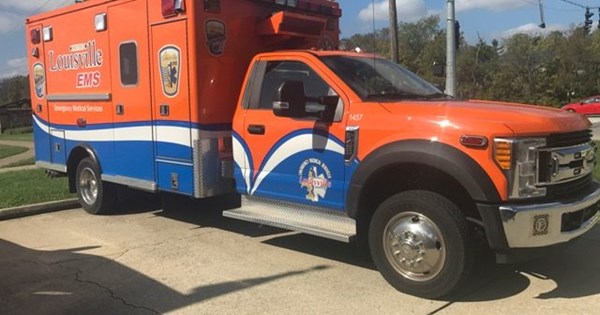 Over the hum of the diesel engine, a call came through the radio: “131…We have a Code 3: 25-year-old white female, possible heroin overdose…” The lights and sirens turned on, and before I knew it, we were on our way to our second overdose in just as many hours. As a third-year medical student, I am relatively new to clinical medicine and was completely naïve to the out-of-hospital care patients receive from EMS. I was curious about just what exactly EMS does, so I decided to devote some of my elective time to figuring it out. I had some preconceived notions of what I would learn before starting my school’s EMS elective, but I really had no idea what I was getting into. I was excited to start IVs in the back of an ambulance, use a bag mask to ventilate patients in respiratory distress, and place ECG leads on a person in cardiac arrest. However, I was in no way prepared for just how much a weeklong elective could change my views of medicine and patient care.
Over the hum of the diesel engine, a call came through the radio: “131…We have a Code 3: 25-year-old white female, possible heroin overdose…” The lights and sirens turned on, and before I knew it, we were on our way to our second overdose in just as many hours. As a third-year medical student, I am relatively new to clinical medicine and was completely naïve to the out-of-hospital care patients receive from EMS. I was curious about just what exactly EMS does, so I decided to devote some of my elective time to figuring it out. I had some preconceived notions of what I would learn before starting my school’s EMS elective, but I really had no idea what I was getting into. I was excited to start IVs in the back of an ambulance, use a bag mask to ventilate patients in respiratory distress, and place ECG leads on a person in cardiac arrest. However, I was in no way prepared for just how much a weeklong elective could change my views of medicine and patient care.
No other experience in medical school has allowed me to actually enter the homes of my patients and insert myself into their lives, if only for a brief moment. I was able to see where they lived, what kind of food they ate, the conditions they lived in, and even the pets they kept. I was able to see the worry and heartbreak on the faces of family members as we loaded their loved ones into the ambulance. I was able to see the extreme poverty and equally as extreme wealth and get to experience the varied neighborhoods that make up this great city that I call home. I was able to see addiction ruin lives and alcohol cause mayhem on the streets. Most important, I was able to see my patients for who they truly are, not just a set of symptoms and vital signs sitting in front of me on an exam table. I wasn’t worried about asking the right questions to properly complete an HPI or remembering all the steps for a neuro exam, but I was awarded the time to talk to patients like humans and truly learn their stories. I had the opportunity to briefly glimpse into the lives of these people – and it is something I will never forget.
As my role changes from medical student to physician over the next year and a half, experiences like this will shape who I am as a doctor. When a patient arrives to the emergency department overdosed on heroin, I will be thinking about those worried faces of the family members I met as I try to resuscitate their loved one. When a drunk man comes through the doors at 3 am, I just might have a better understanding of how he ended up in that situation. Medicine is so much more than lab values and algorithms; it is about treating patients by getting to know who they are and where they come from. Spending time with EMS opened my eyes to the humanity of medicine and entrusted me with tools to become the best physician I can be.
For students pursuing an elective with EMS: You are going to have a great time on this elective, and your eyes will be opened to the prehospital aspect of patient care. Be as involved as you can be and don’t be afraid to jump in. Pay attention to how the EMS crews treat their patients, and learn from them. Success here is rooted in flexibility and an eagerness to learn. Take a minute to slow down, soak in your surroundings, learn about the very people you will be treating, and take away aspects that you will incorporate into you future career as a physician.



